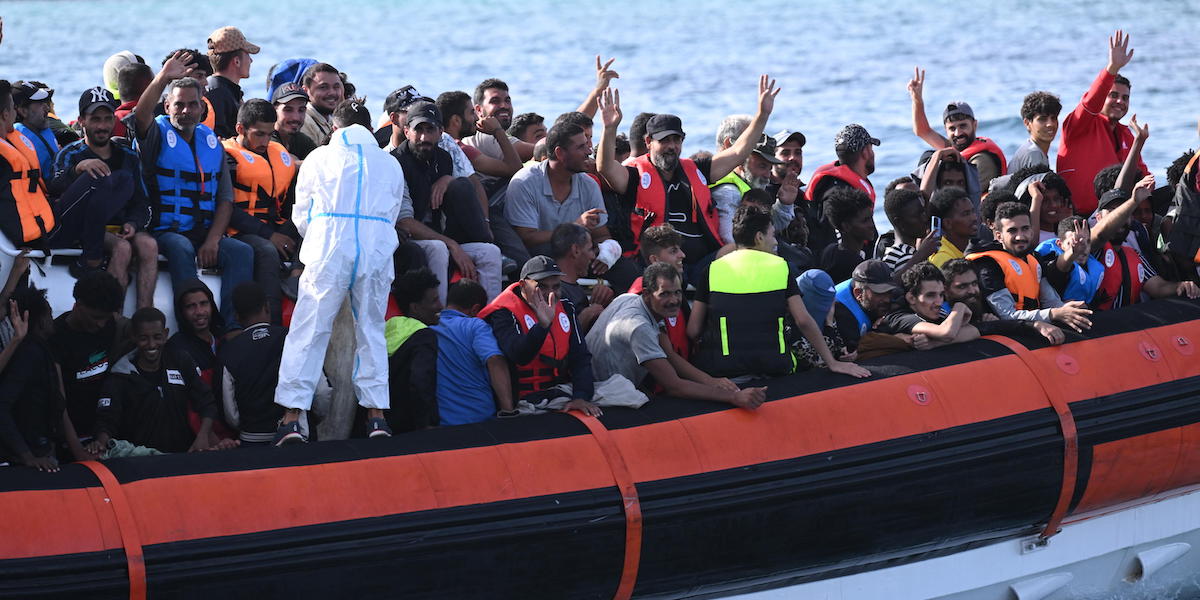On Wednesday the Council of the European Union, the body in which the governments of the 27 member states of the Union are represented, reached an agreement on an important piece of the reform of the Dublin regulation, the European rule that regulates the management of migrants and asylum seekers. It was a small political victory for Giorgia Meloni’s Italian government: last week it had not been possible to approve the text because Italy did not agree with a passage wanted by the German government, in which the role of humanitarian operations was defended of NGOs in the Mediterranean Sea. In the past few hours, Germany he had chosen to give in and remove that paragraph: the Council therefore approved the new version of the text.
However, Italy’s victory is more than anything else symbolic: leaving aside the paragraph on NGOs, in fact the text of the agreement has remained the same. That same paragraph has been moved from the text to the premises without modification, and says: «According to European standards, humanitarian aid operations should not be considered as an exploitation of migrants, when there is no objective of destabilizing the Union or a Member State”.
In any case, according to migration experts the reform as a whole is so unambitious that for Italy it will not change much compared to the current situation. The rule according to which the first country of entry of an asylum seeker will have to take responsibility for hosting him and examining his request, which today generates a considerable burden for Italy, will not be changed.
Italy has decided to support the reform probably because it contains the promise to strengthen border surveillance and agreements with the main countries of departure to forcibly block migrants: an approach that in the short term reduces arrivals by sea in Italy but which generates a lot of suffering in the countries of departure and a higher number of deaths at sea.
The disagreement between Italy and Germany concerned a secondary document, the “Regulation on crisis situations and force majeure in the field of migration and asylum”, within the broader discussion to reform the Dublin Regulation. A preliminary agreement was reached in June, after which, however, a series of details still remained to be clarified, including this document.
Although secondary, the document in question had acquired a certain importance especially after in recent weeks the governments of Italy and Germany had clashed several times over the role of NGOs carrying out rescue operations in the Mediterranean Sea: Germany considers their work very important for the fulfillment of the tasks that the European Union sets itself at a legal, humanitarian and moral level; Italy, on the other hand, claims that the presence of NGO ships in the Mediterranean pushes and incentivizes migrant people to leave (a thesis that has long been debunked by many experts).
In this context, the passage on NGOs that Germany wanted to include in the text of the “Regulation on crisis situations” had become a point of conflict. Overcoming the stalemate between Italy and Germany has unblocked the discussion and in the coming months should allow us to proceed with the reform of the Dublin regulation.
It is not clear exactly why the German government decided to give in on this point: even the German newspapers they are speaking explicitly of a political victory for Italy, however small. It is possible that Olaf Scholz’s centre-left government preferred to sell itself the fact that it had found a compromise to unlock a more comprehensive reform of the Dublin regulation.
The preliminary agreement on changes to the Dublin regulation approved in June provides above all for a strengthening of the principle according to which the reception of migrants must be the responsibility of the countries of first entry. In the event of large arrivals of asylum seekers, the agreement provides for a portion to be transferred to other countries, but on a voluntary basis. Not everyone will participate in these relocations: governments will be able to choose to pay a certain amount for each asylum seeker who non will welcome, and in that case the asylum seekers will remain in the first country in which they entered the European Union (i.e. almost always Italy, for people arriving by sea from Tunisia and Libya).
If everything goes smoothly by the end of the year the Council should conclude its work on the reform, and therefore involve the European Parliament. To come into force by the end of the legislature, which will end in June 2024, Parliament and the Council will have to reach an agreement on the new reform in the first months of 2024.
The Council of the European Union is the body composed of a government representative for each country of the Union, depending on the topic being discussed: last week, when the agreement had not been reached, the ministers of Interior of various countries. On Wednesday, Coreper, a body of the Council of the European Union which brings together the permanent representatives of the member states in the European institutions, met.
